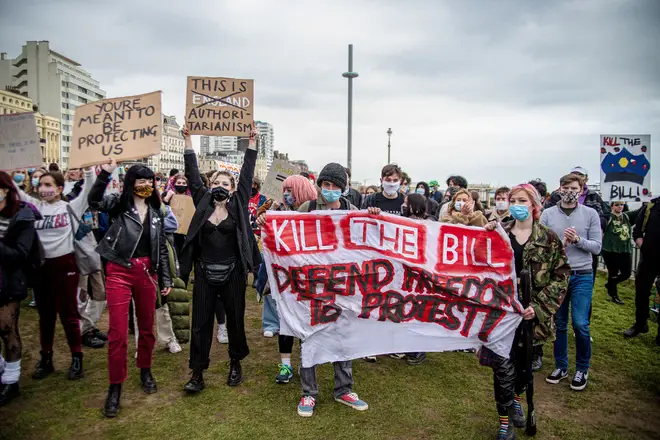
Ali Miraj 1pm - 4pm
22 March 2021, 20:25 | Updated: 23 March 2021, 16:24

Coronavirus restrictions against protests in England are among a raft of measures that will be lifted from next Monday in a move that has been branded a government "U-turn".
From 29 March, demonstrations will once again become an exception to the rule that bans group gatherings.
Protests will be given the green light under the laws if they are organised by a business, the public, a political body or other groups and so long as "required precautions" are taken.
These are likely to include measures such as ensuring people wear face masks and maintain their social distance. However, there will be no limitations on the number of people free to attend such events.
The ban on demonstrations was introduced to prevent large gatherings during the coronavirus lockdown, which sparked disturbing scenes at the Clapham Common vigil for Sarah Everard earlier this month.
Ministers confirmed on Monday that the easing of protest restrictions will be one of a number of measures being altered, suspended or removed outright as part of England's roadmap out of lockdown.
It comes following several days of fierce criticism from Tory backbenchers that the easing of measures is not happening fast enough due to the success of the UK's vaccine rollout.
Read more: Govt struggling to defend six-month extension to lockdown powers
Read more: Tory rebels challenge PM's plans to extend lockdown powers until October

Nick Ferrari clashes with Care Minister over lockdown power extension
Among the restrictions being withdrawn from the Coronavirus Act is a section that has been described by Liberal Democrat leader Sir Ed Davey as a part that "reduces people's rights to care".
The party leader, who is a patron of the Disability Law Service, said he is "glad ministers have finally accepted that care rights must be fully restored" and "U-turned" on the "unlawful and unnecessary restriction of care rights".
"However, far too many people are still missing out on the care they need because of the Conservative Government’s failure to give local councils the funding they need," he added.
In addition, ministers will remove the section that extended the amount of time the authorities could retain fingerprints and DNA profiles.
A government spokesperson said the six-month extension will not continue after next Monday unless voted on in Parliament.
However, lawyer and LBC presenter Daniel Barnett said the measures were being allowed to lapse as they were either "technical legislation which was never used", or restrictions that "the government doesn’t plan to invoke in the future".
Read more: Holidaymakers risk £5k fine as new laws outlaw leaving UK without excuse
Watch: Nick Ferrari clashes with minister over lockdown power extension
Protest will once again be exempt from restrictions on gatherings from 29th March.
— Liberty (@libertyhq) March 22, 2021
This is good news, but safe, socially distanced protests must be able to go ahead NOW.
[New regs published here: https://t.co/YQYAyEmTSx] pic.twitter.com/vlylLaC4qY
From 29 March, up to six people, or two households, will be permitted to meet in outdoor spaces as England moves to the next stage of the roadmap out of lockdown.
But exemptions to the 'rule of six' include protests, picketing and gatherings organised by charities or political groups.
The government has come under increasing pressure from MPs, peers and campaigners to clarify that demonstrations should be permitted during the Covid-19 pandemic.
Sam Grant, head of policy and campaigns at human rights group Liberty, said: "It is welcome that the next stage of lockdown contains the explicit exemption we've been calling for - this should have remained in place throughout the current lockdown, and it is unacceptable for it to wait until next week."
Meanwhile, Conservative MPs, including Sir Iain Duncan Smith and Steve Baker, have raised concerns about the government’s plans to extend lockdown powers in England.
Parliament is set to approve an extension to the Coronavirus Act, which gives the government emergency powers to tackle the pandemic, later this week.
Read more: Will Brits be able to go on foreign trips? LBC asks a Government Minister
Watch: Starmer says his 'default position' is to support lockdown powers extension

Government must 'look at the data' on lockdown easing
Mr Baker, the Covid Recovery Group deputy chairman, said he expects to vote against the "disproportionate, extreme, and wholly unnecessary" measures on Thursday, while Sir Iain told LBC the timetable was “looking very slow compared to where we think the reality is".
The new rules will also allow students to return home during the Easter holiday.
On Monday, Health Secretary Matt Hancock said: “We are today setting out the legal foundations which, if agreed by Parliament, will deliver the roadmap out of lockdown.
“These measures have been vital to reducing infections, hospital admissions and deaths across the country, and thanks to peoples’ commitment and support, we have made strong progress.
“We are rightly ending as many national measures as safely as possible while maintaining those which remain necessary and proportionate to help reduce and control infections further as we cautiously but irreversibly ease restrictions and our historic vaccination programme continues apace.”

Starmer says he will support plans to extend Covid lockdown powers
A total of 12 provisions will be removed from the Coronavirus Act on Monday:
Three provisions will also be suspended: